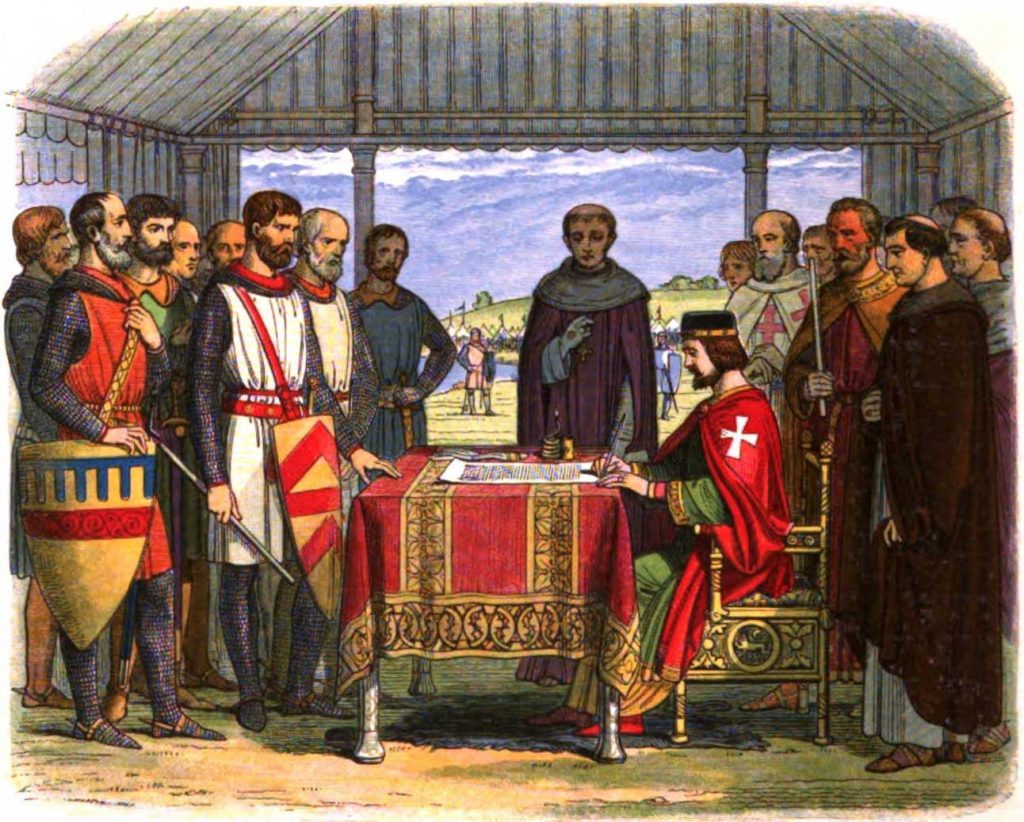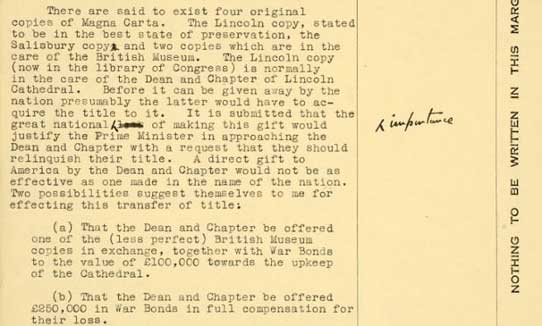
Finest Hour Extras
Proposal by Churchill To Gift Magna Carta

King John signs the Magna Carta. Doyle, James William Edmund (1864) "John" in A Chronicle of England: B.C. 55 – A.D. 1485, London: Longman, Green, Longman, Roberts & Green, pp. p. 226. Wikipedia
June 23, 2018
On 10 March 2015, The Guardian published an untold story titled: “How wartime Britain planned to give the U.S. a copy of the Magna Carta.” The Guardian reported: “A secret British plan to butter up the US during the Second World War by handing over a copy of Magna Carta has been revealed by the British Library.”1
Previously unpublished documents included March 1941 Minutes prepared by the Foreign Office. It proposed that the well-preserved Lincoln Magna Carta, which belonged to Lincoln Cathedral in Lincoln, England, be presented as a gift to the United States. Its purpose was to help muster American public opinion in support of the war.
A review of the Foreign Office Minutes prepared for Prime Minister Winston Churchill’s approval embodied a remarkable proposal.
The story begins with the Lincoln Magna Carta on display in the British Pavilion at the 1939 New York’s World Fair. This first overseas loan of Magna Carta was made on the advice of the Department of Overseas Trade, which hoped that, by reasserting the common origins of British and American liberties, displaying that document would strengthen Anglo-American relations.

2025 International Churchill Conference
Magna Carta drew large crowds at the World Fair. After the outbreak of war in September 1939, it was decided that the Lincoln Magna Carta would be safer in the hands of the United States Government than returned to England.

Momentum to Gift Magna Carta in 1941
Plans to present Lincoln’s Magna Carta to America had been raised as early as the summer of 1939, but no action transpired. The idea gained new momentum when the Lease-Lend Act was passed by the United States Congress in March 1941.
The Lease-Lend Act approved material support for Britain’s war effort. It was suggested in some British quarters that presenting Magna Carta to the United States would further mobilize American public opinion in support of the war.
One British government official wrote that ‘The gift of Magna Carta would be at once the most precious of gifts and the most gracious of acts in American eyes; it would represent the only really adequate gesture which it is in our power to make in return for the means to preserve our country.’
Churchill and Magna Carta
Magna Carta Libertatum (Medieval Latin for “the Great Charter of the Liberties”), commonly called Magna Carta, is a charter agreed to by King John of England at Runnymede, near Windsor, on 15 June 1215.
The King approved Magna Carter after he faced a possible rebellion by the country’s powerful barons, which followed years of unsuccessful foreign policies and heavy taxation. Magna Carta placed King John, and all of England’s future sovereigns, within a rule of law, which ultimately served as the foundation for the English system of common law.
Churchill in A History of the English-Speaking Peoples, Volume 1, The Birth of Britain wrote of Magna Carta: “In place of the King’s arbitrary despotism they [the barons] proposed, not the withering anarchy of feudal separatism, but a system of checks and balances which would accord the monarchy its necessary strength, but would prevent its perversion by a tyrant or a fool.”
Churchill continued: “The leaders of the barons in 1215 groped in the dim light towards a fundamental principle. Government must henceforth mean something more than the arbitrary rule of any man, and custom and the law must stand even above the King. It was this idea, perhaps only half understood, that gave unity and force to the barons’ opposition and made the Charter which they now demanded imperishable.”2
The Foreign Office Minutes
Churchill received the Foreign Office Minutes dated 18 March 1941, which presented a proposal to give the United States a copy of a Magna Carta. Churchill read the following text [extracted] signed by British Foreign Office official Thomas North Whitehead, an expert on American relations in the British Foreign Office, and cosigned with comments by Rab Butler, Robert Vansittart, and others.
Churchill began reading the Minutes dated 13 March 1941. It was titled Lincoln copy of Magna Carta: “On the 11th March, the Government of the United States passed an Act [Lease-Lend] which has as its wider purpose the furtherance of personal and national freedom throughout the world. Based on enlightened self-interest, this Act none the less represents a landmark in the history of liberty, and under its provisions the British Empire stands to be principal beneficiary.”
“It would be particularly fitting if at this juncture we were to offer the Lincoln copy of Magna Carta to the American nation as a token of the history and traditions which the two countries have in common.”3
The Minutes continued with reference to the thousands of Americans that have waited on line and viewed Magna Carta in the British Pavilion at the New York World Fair. “Magna Carta is a part of American, as well as of English, history and both peoples equally trace their personal liberties from the signing of that document. In some respects Magna Carta has a more vivid appeal for the average American than for the average Englishman,” read Churchill.”4
Churchill went on to read why the gift would benefit both England and the United States. “The gift of Magna Carta would be at once the most precious of gifts and the most gracious of acts in American eyes; it would represent the only really adequate gesture which it is in our power to make in return for the means to preserve our country.”5
Immediate Assistance to England
Churchill read of the advantage to England of the gift: “The immediate benefit of such an action would be greatly to heighten the emotional interest of Americans in this country, which would thereby assist the President in his task of carrying public opinion with him in giving us increasingly greater assistance. [It will be remembered that the Lease-Lend Act does not actually give us anything; it empowers the President to assist us within the practical limits set by public opinion].”
The Minutes continued: “At any time previously to the passage of this Act such a gift might well have been interpreted as a form of propaganda. However, the passing of the Act is widely regarded by Americans as a final decision to support our Cause and therefore, if Magna Carta were to be given now our motives would not be taken amiss.”6
Four Magna Carta Copies in Existence
Churchill read that there were said to exist four original copies of Magna Carta. The Lincoln copy was stated to be in the best state of preservation, and there was a Salisbury copy, and two copies in the care of the British Museum. The Lincoln copy, then in the United States on display, was ordinarily in the care of the Dean and Chapter of Lincoln Cathedral.
Churchill read on: “Before it can be given away by the nation presumably the latter would have to acquire the title to it. It is submitted that the great national loss (here Churchill crossed out the word ‘loss’ and added ‘importance’) of making this gift would justify the Prime Minister in approaching the Dean and Chapter with a request that they should relinquish their title. A direct gift to America by the Dean and Chapter would not be as effective as one made in the name of the nation.”7
Effecting Transfer of Title
Churchill read that two possibilities were offered to transfer the title of the Magna Carta from the Lincoln Cathedral to the nation:
- The Dean and Chapter be offered one of the less perfect British Museum copies in exchange, together with War Bonds to the value of £100,000 towards the upkeep of the Cathedral.
- The Dean and Chapter be offered £250,000 in War Bonds in full compensation for their loss.8
Recommendations on Official Announcement
The Foreign Office recommended to Churchill that whatever method occurs in which the nation acquires title, “it was strongly recommended that the gift be announced as quickly as possible, in fact within a few days, so soon as an agreement in principle can be reached with the Dean and Chapter of Lincoln. For the effect on Americans would be greatly enhanced if the gift came almost immediately after the passing of the Lease-Lend Act and thus appear as a graceful acknowledgement.”9
“If the gift were delayed to the late spring or summer when its relation to the Act would not be so apparent, it might be looked upon as a crude attempt to induce the Americans to do more for us.”10
The Minutes went on to recommend that “The gift might perhaps be announced either by the Prime Minister in the House or, alternatively, by The King in a broadcast message to Great Britain and America. An appropriate ceremony in Washington to hand over the physical document to the United States authorities should follow as quickly as possible.”11
At the end of the Minutes, Richard Austen Butler, who was known as Rab Butler, added a note among others supporting the gift. Butler wrote: “I would like the Prime Minister read these minutes by the week-end. I am very much in favor of making this gift, I would repay Lincoln Cathedral by giving them one of the British Museum copies. This would necessitate a Bill & thus give an opportunity for airing democratic principles here. This psychological moment is probably as good as any other. Rab”12
Churchill responded in red ink alongside Butler’s note:
Mr. Butler
Bring before Cabinet on Monday.
WC 13
With Churchill’s support, the prospect for passage in Parliament and the likelihood of a transfer appeared promising. Unexpectedly, however, it was determined that the Dean and Chapter of Lincoln Cathedral were unwilling to surrender their Magna Carta.
By mid-April 1941, the British government had quietly dropped the proposal. The Lincoln Magna Carta spent the remainder of the war securely locked and protected in Fort Knox. The Magna Carta was returned to the Lincoln Cathedral in England in 1946 and housed at Lincoln Castle.
Published by kind permission of Fred Glueckstein. 2018 © All Rights Reserved.
End Notes
1. Mark Brown, The Guardian: How wartime Britain planned to give the US a copy of Magna Carta: British Library Papers reveal plot to relinquish Lincoln cathedral Magna Carta to persuade America to enter second world war: ‘After all, we possess four copies’. 10 March 2015.
2. Winston S. Churchill, A History of the English-Speaking Peoples, The Birth of Britain, Volume 1. (London: Cassell and Company Ltd), pp.198-199.
3. National Archives UK. Document. Lincoln copy of Magna Carta. Minutes. Signed. T North Whitehead, 13 March 1941.
4. Ibid.
5. Ibid.
6. Ibid.
7. Ibid.
8. Ibid.
9. Ibid.
10. Ibid.
11. Ibid.
12. Ibid.
13. Ibid.
Subscribe
WANT MORE?
Get the Churchill Bulletin delivered to your inbox once a month.



